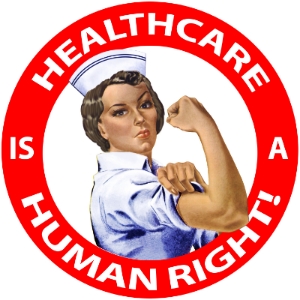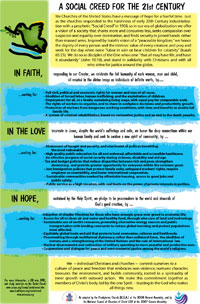And If So, What Difference Does It Make?
Healthcare is a very good thing for governments to provide, whether or not it is a human right, because it is certainly a basic human good and is necessary for human flourishing. The social provision of healthcare can be considered part of the natural state of human beings because for our species, culture – including the growth of medical knowledge – is a natural development. Medicine alone does not create health but is related to good nutrition, exercise, and a host of social and environmental factors. Good medical care reflects enormous social investment over time in science, technology, and treatment experience. European nations, Japan, and many other societies have long provided varying levels of social insurance for all citizens that include healthcare.
In the US, the extension of healthcare to 30 million people through the Affordable Care Act (ACA) has been bitterly opposed, with some governors and statehouses refusing to extend even federally supported benefits to poorer residents. Behind the legal question of whether the residents of those states could allege discrimination and unequal treatment, there is a fierce moral and political debate – and real human suffering. The ACA has even re-opened debates about whether the New Deal social protections were socialist, though—to take this seriously for a moment—most of the countries once burdened with state “socialism” still value their public healthcare. In the US, if healthcare were considered a human right, residents of states which turn down ACA help would have a stronger position from which to challenge their deliberate exclusion from a benefit available elsewhere.
___________________________________________
A Christian position goes beyond charity or voluntary concern to support healthcare because that individualistic model makes us, not God, the chooser of who is deserving of full value.
___________________________________________
Following President Franklin Roosevelt, who believed strongly in healthcare as a human right (see his Second Bill Rights, 1944), President Obama has stated that healthcare is a right for everyone. This contrasts with the view that healthcare is a commodity or even a privilege conditioned on one’s income. Yet even in calling for “an equitable, efficient, and universally accessible health plan” and for quality care, the Presbyterian Church (U.S.A.) has generally avoided the debate over whether access to healthcare is a right. General Assembly statements have also not used the word, “entitlement,” which is often disparaged by the most entitled politicians and pundits. So the question is partly philosophical and theological, but at the same time it directly impacts the respect that must be paid all citizens, even poor ones. A right implies something irreductible and intrinsic based on inclusion in the human community, even if the benefits and burdens vary by a society’s capacity.
The strongest claim for a healthcare “right” in Presbyterian social witness policy seems to come in a 1976 statement quoted in the rationale to the 2008 General Assembly resolution in favor of a single-payer system for universal healthcare—a strong prophetic position that took many observers off-guard. Who knew that your average Presbyterian commissioner did not think insurance companies were necessary?! (The policy citations in that 2008 rationale are quoted below.)
 This editorial provides arguments for considering healthcare a human right and hence a responsibility of government, though also a matter of individual and communal responsibility. This means claiming that the language of rights is native or even natural to the Reformed tradition and that our understanding of the covenants that hold persons in communities defends “positive” as well as “negative” rights. There are obviously counter-arguments at each step, including the broad argument that more “rights” language would strengthen the individualist and contract-ridden nature of our society and weaken the covenantal, communitarian values we really need. But perhaps there is a way that more rights could mean less inequality and suffering.
This editorial provides arguments for considering healthcare a human right and hence a responsibility of government, though also a matter of individual and communal responsibility. This means claiming that the language of rights is native or even natural to the Reformed tradition and that our understanding of the covenants that hold persons in communities defends “positive” as well as “negative” rights. There are obviously counter-arguments at each step, including the broad argument that more “rights” language would strengthen the individualist and contract-ridden nature of our society and weaken the covenantal, communitarian values we really need. But perhaps there is a way that more rights could mean less inequality and suffering.
While this will not be a heavily Biblical argument, the positive responsibility to help the health of others is often traced back to Jesus’ healing, which was partly restoring people to community and thereby restoring the community to health and wholeness as well. Even the very secular Johns Hopkins Hospital, endowed by a Quaker who expressly stipulated no religious connection, ended up with a massive and beautiful statue of Jesus the Healer in one of its main lobbies. In terms of the universal moral law and its equal presence in all people, Paul states clearly that all have that law “written on their hearts” (Romans 2:15, see also 3:19), and the Reformed confessions repeatedly use the 10 Commandments and other Old Testament resources to define both spiritual and material obligations binding upon all. Calvin’s Commentary on the commandments very creatively gives the “Shalt Nots” positive application in terms of duties to neighbors.
In a very concise personal distillation of his career-long engagement with human rights, Presbyterian ethicist David Little defines human rights:
“the existence of subjective claims, regarded as inborn and unearned, that are antecedent to and independent of governmental authority, and that ascribe to individuals a legitimately enforceable moral title or warrant to constrain the behavior of other people in such things as exercise of conscience, political participation, control of property, and resistance to arbitrary injury…” In that short chapter, Religion and Human Rights, Little shows a strong genealogy of human rights in the Reformed tradition going back to Calvin’s “inner forum” of conscience and commitment to a universal moral law.[1]
Nicholas Wolterstorff, a Reformed philosopher, in his Justice: Rights and Wrongs, argues that “rights are what respect for worth requires,” and provides a theistic basis for human rights that (like Little) shows its origins in Christian thinking well before the Enlightenment of the 1700’s.
 In the evolution of human rights, it is sometimes helpful to distinguish civil and political human rights from economic, social and cultural rights, although the boundaries are somewhat porous. The Universal Declaration of Human Rights (1948) leads with the “negative” rights that protect individuals from government or other potentially oppressive forces, but includes healthcare in articles 23 and 25. In 1966, many nations adopted the International Covenant on Economic, Social and Cultural Rights which entered into force in 1976, defining these economic, social, and cultural rights more broadly. Grace Y. Kao addresses the cross-cultural and religious bases for human rights in Grounding Human Rights in a Pluralist World and combines some of the “maximalist” arguments (such as Reformed Christian claims) and more procedural, secular, or “minimalist” claims (including less theistic traditions) to support universal applicability.
In the evolution of human rights, it is sometimes helpful to distinguish civil and political human rights from economic, social and cultural rights, although the boundaries are somewhat porous. The Universal Declaration of Human Rights (1948) leads with the “negative” rights that protect individuals from government or other potentially oppressive forces, but includes healthcare in articles 23 and 25. In 1966, many nations adopted the International Covenant on Economic, Social and Cultural Rights which entered into force in 1976, defining these economic, social, and cultural rights more broadly. Grace Y. Kao addresses the cross-cultural and religious bases for human rights in Grounding Human Rights in a Pluralist World and combines some of the “maximalist” arguments (such as Reformed Christian claims) and more procedural, secular, or “minimalist” claims (including less theistic traditions) to support universal applicability.
To defend the right of any person to healthcare in a society with the capacity to provide it is to argue for that person’s unique value and for the social order to be understood as a community of mutual obligation. Clearly some forms of equitable payment go along with equitable provision, but those costs are to be defined by the scope of human needs and inherent dignity. A Christian position goes beyond charity or voluntary concern to support healthcare because that individualistic model makes us, not God, the chooser of who is deserving of full value. Presbyterian policy statements warn that optimum healthcare and perfect health, even if achievable, are not ends in themselves (or even idols) but are to enable more joyful and effective discipleship.
___________________________________________
To defend the right of any person to healthcare in a society with the capacity to provide it is to argue for that person’s unique value and for the social order to be understood as a community of mutual obligation.
___________________________________________
Christopher Marshall, a New Zealand Mennonite, argues from our creation “in the image of God” that rights are “ingredients of relationships” and can include collective or community rights, which could move toward self-determination. He writes of rights:
“They therefore intersect with other relational qualities, such as loyalty, obligation, self-sacrifice, and love. To speak of individuals possessing inherent rights gives primacy to autonomy, privacy, individual agency, and personal choice. When viewed as relational attributes, however, rights accent fraternity, interdependence, and responsibility.” He further maintains that there is an indivisibility of rights: “…because the divine image relates to the totality of human experience of responsibility, representation, and relationality, and because of our inseparable unity as body and soul, there can be no normative justification for favoring individual rights over social, cultural, or economic rights, or vice versa.”[2]
 In developed societies, universal access to healthcare may also be associated with public education: the Social Creed for the 21st Century adopted by the Presbyterian Church (U.S.A.) and the National Council of Churches of Christ puts healthcare and education on the same line: “High quality public education for all and universal, affordable, and accessible healthcare.” That Social Creed also calls for “Full civil, political, and economic rights for women and men of all races.” But even if the universal need for healthcare is enough of a reason for it to be a claim on the resources of society, is it necessary to call it a right? The Social Creed, which is quite strong, does not name healthcare as an explicit right. It could be a good ecumenical conversation to see whether other denominations consider healthcare a human right.
In developed societies, universal access to healthcare may also be associated with public education: the Social Creed for the 21st Century adopted by the Presbyterian Church (U.S.A.) and the National Council of Churches of Christ puts healthcare and education on the same line: “High quality public education for all and universal, affordable, and accessible healthcare.” That Social Creed also calls for “Full civil, political, and economic rights for women and men of all races.” But even if the universal need for healthcare is enough of a reason for it to be a claim on the resources of society, is it necessary to call it a right? The Social Creed, which is quite strong, does not name healthcare as an explicit right. It could be a good ecumenical conversation to see whether other denominations consider healthcare a human right.
Despite philosophical, legal, and policy ramifications far beyond this brief sampling, the Unbound reader may want to use the “duck test” to determine how to classify healthcare: if it is universal like a right, respectful of intrinsic worth like a right, and a fundamental necessity for social participation like a right, then maybe healthcare is a human right.[3]
Less facetiously, maybe it’s the right time for our society to have this discussion.
[1] Christianity and Human Rights, edited by Frances Adeney and Arvind Sharma, (Albany: State University of NY, 2007), p. 86.
[2] (Pandora/Herald, 2001), pp. 60- 61.
[3] The duck quote is attributed to James Whitcomb Riley: “When I see a bird that walks like a duck and swims like a duck and quacks like a duck, I call that bird a duck.”
From the Rationale of the 2008 Resolution on Single Payer Healthcare:
The General Assembly of the Presbyterian Church (USA) voted to: “Endorse in principle the provision of single-payer universal health care reform in which health care services are privately provided and publicly financed.” There were other positions taken, followed by a rationale. That rationale included references to previous Assembly actions:
“b) Accessibility: “We believe that all people possess inherit worth as children of God, and that God’s promise extends to all. Health coverage must be available to all persons living in the United States, regardless of income, race or ethnicity, geography, age, gender, employment status or health status” – G.A. Minutes, 1994, p.574 and 2002, p.634; Equity: “Because the right to acquire adequate health care springs out of our worth as living human beings, rather than out of any particular merit or achievement belonging to some but not to others, adequate health care should be defined equally for all people.” – G.A. Minutes, 1976, pp. 203-207; Responsible Financing: “Since society has an interest in the health of its people, those individuals and organizations who can pay should help to finance the care of those individuals and families who cannot pay. While concerns for the costs of health care are appropriate, these concerns must continually be balanced against the objectives of adequate, quality care for all. The sacrifice of access and quality at the shrine of cost containment is too high a price to pay and should not be tolerated.” – G.A. Minutes, 1991, p. 817 and 1988, p. 525.”
Click here for the rest of this week’s articles.
Read more articles in this series.










Pingback: Christian Iosso: Is Healthcare a Human Right? ...
Pingback: Health Care, A Human Right | That Which We Have Heard & Known